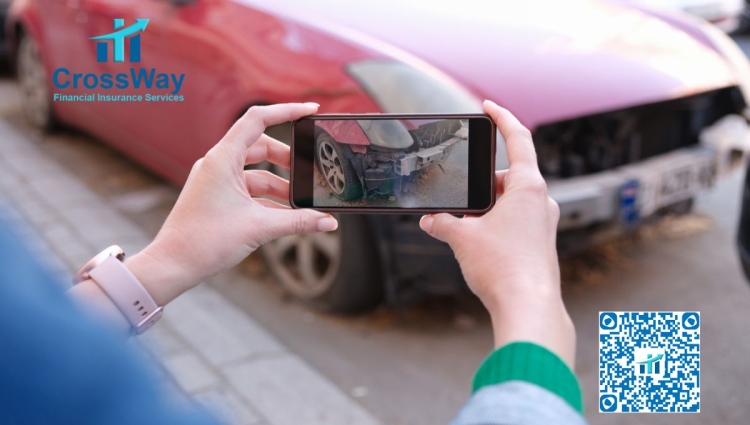Accidents are often sudden and can be overwhelming, but knowing what to do immediately afterward can greatly impact your safety and the resolution of the incident.
At CrossWay Financial & Insurance Services, we want to ensure you are well-prepared to handle such situations effectively.
Be Prepared Before an Accident
1. Documentation:
- Always keep your vehicle registration, insurance card, and a list of emergency contacts in your car.
- It's also wise to have a notepad and pen, as well as a smartphone with a camera to document the scene.
2. Emergency Kit:
- Equip your car with an emergency kit that includes items such as road flares, cones, a flashlight, and basic first-aid supplies.
3. Insurance Review:
- Regularly review your auto insurance policy to ensure it provides adequate coverage for various accident scenarios.
Immediate Actions at the Scene
1. Ensure Safety:
- The first priority is to ensure everyone's safety. If possible, move your vehicle to the side of the road to avoid obstructing traffic and further hazards.
2. Check for Injuries:
- Check yourself and passengers for injuries. Call 911 immediately if there are any injuries, even if they seem minor. Emergency responders are trained to assess and handle injuries properly.
3. Secure the Scene:
- Use your emergency kit to set up road flares or cones to alert other drivers to the accident scene. This can help prevent additional accidents.
Documenting the Incident
1. Gather Information:
- Exchange names, addresses, phone numbers, driver's license numbers, vehicle registration details, and insurance information with the other driver(s) involved.
- Note the make, model, year, and license plate number of the other vehicle(s).
2. Take Photos:
- Use your smartphone to take clear photos of the scene, including all vehicles involved, any visible damages, the road conditions, and any relevant traffic signs.
3. Witnesses:
- If there are any witnesses, obtain their names and contact information. Their statements can be invaluable during the claims process.
Notify Authorities
1. Call the Police:
- In many areas, it's required by law to call the police if there's significant damage or any injuries. Even if it's not required, having a police report can be beneficial when filing an insurance claim.
2. File a Report:
- The police will document the scene and provide an official report. Ensure you get the report number and the names of the responding officers.
Starting the Claims Process
1. Contact Your Insurance Provider:
- Notify your insurance company as soon as possible to start the claims process. Provide them with all the information you've gathered and follow their instructions for next steps.
2. Follow Up:
- Keep track of your claim and stay in contact with your insurance provider to ensure a smooth and timely resolution.
Being prepared and knowing these steps can make a stressful situation more manageable and ensure you and your loved ones are protected. For more comprehensive advice and assistance with your auto insurance needs, visit CrossWay Financial & Insurance Services.




 And then Add to Home Screen.
And then Add to Home Screen.